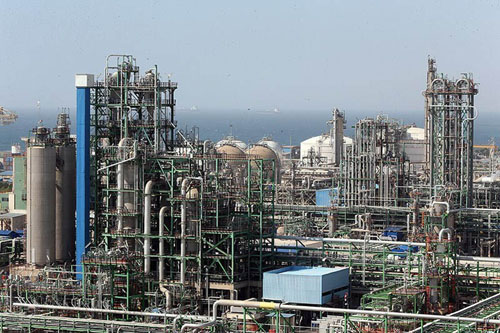by WorldTribune Staff, September 6, 2019
As the United States ramped up its “maximum pressure” campaign against Iran via energy sector sanctions, Russia said it was considering offering a $10 billion lifeline to Teheran’s vital oil industry.
The U.S. Treasury Department on Sept. 4 announced sanctions on 25 Iranian entities and 11 vessels while offering a $15 million reward for “actionable” information on the Islamic Republic’s “oil-for-terror” network.

Treasury said those sanctioned are part of a network “directed by and [which] financially supports” the Islamic Revolutionary Guard Corps’ (IRGC) foreign arm, the Quds Force, and the Iranian-backed Lebanese terrorist organization Hizbullah, Radio Free Europe/Radio Liberty (RFE/RL) reported.
“This network has moved hundreds of millions of dollars’ worth of illicit oil. That money is then used to fund terrorism,” Brian Hook, the State Department’s special representative for Iran, said in a Sept. 4 briefing.
Meanwhile, Russian Energy Minister Aleksandr Novak said the Kremlin may step in to boost Iran’s struggling oil industry.
Russia would undertake such a plan with Iran “primarily for the development of the oil sector,” Novak suggested.
Novak was speaking at a three-day economic forum in Vladivostok on Sept. 5 where he and Russian officials including President Vladimir Putin were courting senior officials from India, Japan, Malaysia, and Mongolia, among others.
Novak met in Moscow earlier this week with Iranian Energy Minister Reza Ardakanian.
Ardakanian was quoted as saying that Moscow was considering some $10 billion in investment into Iran’s oil sector.
The U.S. Treasury Department noted that, in the spring of 2019 alone, the “oil-for-terror” network “employed more than a dozen vessels to transport nearly 10 million barrels of crude oil, predominantly to the Syrian regime. These shipments, taken collectively, sold for more than half a billion dollars.”
Iran’s former Oil Minister Rostam Qasemi and his son Morteza, are among those hit by the sanctions.
“Also targeted are subsidiaries of an Indian firm with an interest in the Adrian Darya 1, the Iranian tanker the authorities in Gibraltar detained in July on suspicion it was carrying oil to Syria in violation of EU sanctions,” the RFE/RL report said.
Treasury moved to seize any assets in the United States of the designated Iranian individuals and entities and said any individuals or companies who do business with them would be subject to sanctions.
A reward of up to $15 million is being offered for “actionable” information “leading to the disruption of the financial mechanisms of the IRGC and Quds Force. This includes oil sales and tankers that transport Iranian-sourced oil.
Noting that both IRGC and Quds in April were designated terrorist groups, Hook said this is the first time the United States has offered a reward for information “that disrupts a government entity’s financial operations.”
The move comes a day after Washington announced sanctions on Iran’s civilian space agency and two of its research institutes, saying they are being used to advance Teheran’s missile program.
Iran’s Foreign Minister Mohammad Javad Zarif called the punitive measures “totally ineffective.”
Hook said the main goal of the government’s “maximum pressure” campaign on Iran is to “deny the regime revenue to fund its foreign operations” and bring Teheran back to the negotiating table to reach a “new and comprehensive” agreement on its nuclear and missiles programs.
President Hassan Rohani said, as of Sept. 6, Iran would begin developing centrifuges to speed up uranium enrichment as the country’s “third step” to scale back its commitments under the 2015 nuclear deal.
“From Friday, we will witness research and development on different kinds of centrifuges and new centrifuges and also whatever is needed for enriching uranium in an accelerated way,” Rohani said. “All limitations on our research and development will be lifted.”
Intelligence Brief __________ Replace The Media
